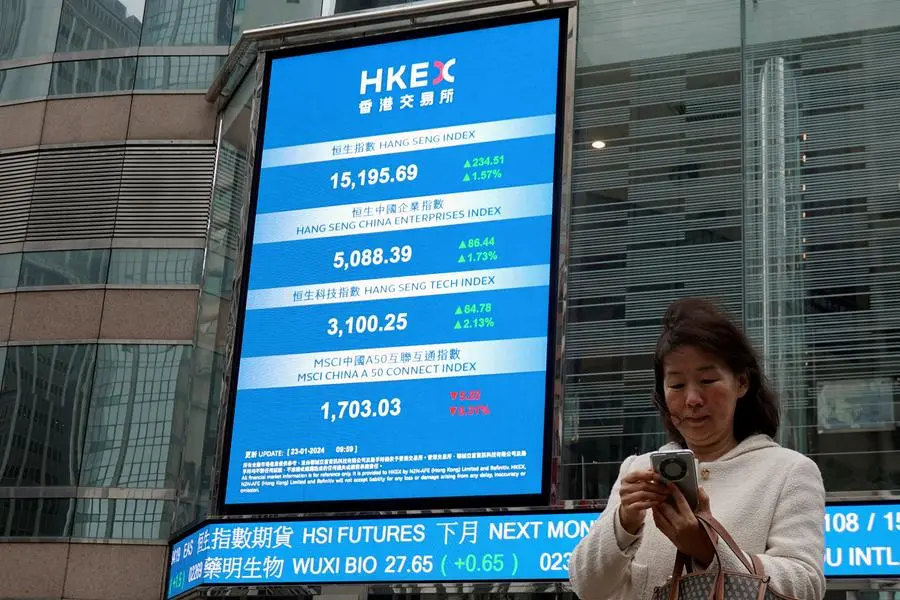PHOTO
World shares gained on Friday, just shy of all-time highs, while the dollar languished around one-year lows after a speech by the world's most powerful central banker confirmed the U.S. would soon begin interest rate cuts.
U.S. Federal Reserve Chair Jerome Powell, in a speech on Friday at the annual economic symposium in Jackson Hole, Wyoming, said "the time has come" to cut interest rates as rising risks to the job market left no room for further weakness and inflation was in reach of the Fed's 2% target, offering an explicit endorsement of an imminent policy easing.
“What he’s suggesting here is if the labor market continues to weaken, we’re looking at a 50-basis-point rate cut in September as opposed to 25," said Peter Cardillo, chief market economist at Spartan Capital Securities in New York.
On Wall Street, the Dow Jones Industrial Average rose 0.69% to 40,993, the S&P 500 gained 0.87% to 5,618 and the Nasdaq Composite gained 1.20% to 17,830.
Europe's broad Stoxx 600 index rose 0.1% after Asian shares outside Japan had nudged down 0.1%, but Japan's Nikkei gained 0.4% as investors digested inflation data and remarks from Bank of Japan Governor Kazuo Ueda flagging a willingness to raise interest rates if the economy and inflation turn out as forecast.
That left MSCI's all country world index up 0.8%, and with early August's turmoil in the rear view mirror, it is now trading near its mid-July all-time peak.
Markets are fully priced for a 25 bp U.S. rate cut in September and see a cut at each of the Fed's three remaining meetings this year, and for one to be a larger 50 bp move.
On the final night of the four-day Democratic National Convention, Vice President Kamala Harris promised to be a "realistic," "practical" president for all Americans if elected.
For the bond market, expectations that rate cuts are coming have kept U.S. Treasury prices supported and not giving back their safe-haven gains from early August.
Following the Powell speech, the yield on benchmark U.S. 10-year notes was down 5.7 basis points at 3.805%, from 3.862% late on Thursday. The 2-year note yield, which typically moves in step with interest rate expectations, fell 6.7 basis points to 3.9427%, from 4.01% late on Thursday.
Its German equivalent was steady at 2.224%.
The low U.S. yields have hurt the dollar, which has lost ground on almost all major peers in August.
The euro was last at $1.1115, steady on the day and just off a 13-month peak hit earlier this week, and sterling was up 0.24% at $1.3125, battling to push through its July 2023 level, which would take it to its highest in well over two years.
The Japanese yen strengthened, with the dollar down 0.8% at 145.16 after Bank of Japan Governor Ueda's comments on rates.
"The yen buying today is understandable given Governor Ueda showed very little sign of a shift in the views and plans of the BoJ following the financial market turmoil earlier this month," said Derek Halpenny, head of research global markets EMEA at MUFG, in a note to clients.
Data out early in the day showed Japan's core inflation accelerated for a third straight month, but a slowdown in demand-drive price gains suggest no urgency for any immediate rate hikes.
Oil gained but was still set to end the week lower as swelling U.S. crude stocks and a weakening demand outlook in China have led to pessimism. U.S. crude gained 2.1% to $74.54 a barrel and Brent rose to $78.63 per barrel, up 1.83% on the day.
Gold prices added 1.16% to $2,512.06 an ounce, recharging towards the record high of $2,531.6 hit just on Tuesday.
(Reporting by Lawrence Delevingne in Boston, Alun John in London and Stella Qiu in Sydney. Additional reporting by Stephen Culp in New York. Editing by Shri Navaratnam, Kim Coghill, Chizu Nomiyama and Susan Fenton)




















